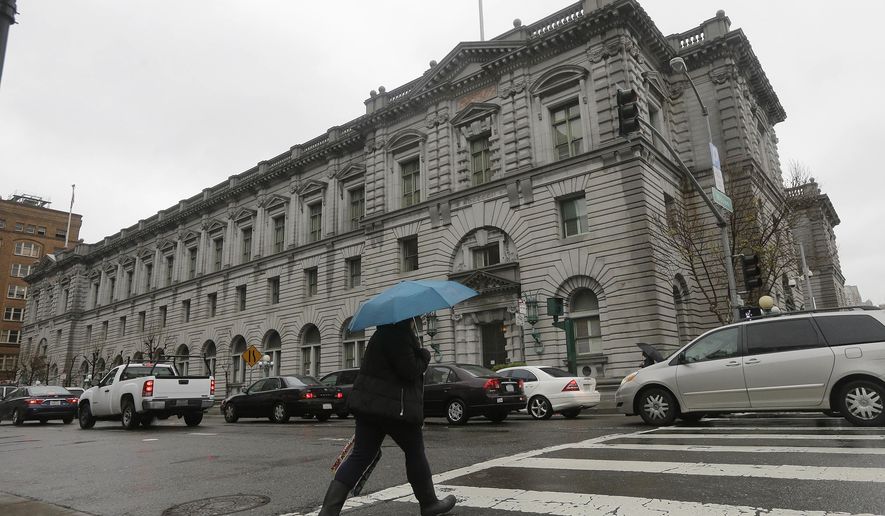Fernando Cordero sounds like a villain in “The Girl With the Dragon Tattoo.”
If prosecutors are to be believed, the Mexican immigrant spent years using his position as a psychologist for Santa Barbara County, California, raping and sodomizing female patients, filming the assaults and ensuring victims’ silence by threatening to send them to jail or a mental hospital. At the very least, Cordero admits to having sex with his patients and was convicted of trying to silence them.
This is why the 9th U.S. Circuit Court of Appeals’ ruling this week in favor of Cordero’s bid to prevent his deportation was so surprising.
In a complex decision, the three-judge panel ruled 2-1 that California’s law on obstruction of justice doesn’t match federal law, so Congress didn’t necessarily have Cordero’s case in mind when it wrote its deportation statutes.
That means, the court ruled, that the immigration courts need to go back and redo Cordero’s deportation case without penalizing him for obstruction of justice.
It was, in the fiery words of the case’s dissenting member, Judge Lawrence VanDyke, a “jurisprudential trainwreck”; playing “dirty” with the law; and the latest in a series of “jaw-dropping, always increasing, epic collection of immigration gaffes” from the famously liberal 9th Circuit.
“My colleagues in the majority should be embarrassed,” Judge VanDyke concluded.
He said the facts of Cordero’s case were so egregious that the two Democratic-appointed judges in the majority — Judge Barry Ted Moskowitz, named by President Clinton, and Judge Andrew D. Hurwitz, tapped by President Obama — were reluctant to even recount them.
But he did.
He pointed to stories of seven women, six of them patients, who came forward with stories of him masturbating during sessions, fondling their genitals, being shoved onto a desk and raped, and penetrated with a dildo. Investigators even found the dildo, with DNA that matched both Cordero and a patient.
“Given the facts in cases like this, one might wonder why our court has worked so hard to prevent the deportation of individuals like Cordero-Garcia,” Jude VanDyke wrote in his searing dissent.
Cordero was in the U.S. as a legal permanent resident. That gives him more protection against deportation but doesn’t make him immune.
Under the law, an aggravated felony conviction is supposed to mean deportation — and obstruction of justice is an aggravated felony. The other sexual charges are considered crimes of moral turpitude, which can be grounds for the deportation of a legal immigrant. Still, that can be waived, making the obstruction of justice conviction the fulcrum of Cordero’s deportation case.
Judge Moskowitz, writing the majority opinion, said the job of the court is not to focus on the facts of Cordero’s case, but rather on deportation law.
He said the way California’s law is written, someone can be convicted for obstruction of justice even if there’s no current or anticipated criminal proceeding and no willful malice involved.
Judge Moskowitz said the federal law laying out what constitutes an aggravated felony is narrower, so a conviction under California law doesn’t match the strictures of the federal law.
Andrew “Art” Arthur, a former immigration judge and congressional staffer who worked on immigration law, said these kinds of conflicts arise frequently in immigration law, where most convictions are at the state level, and those statutes frequently don’t match similar federal laws.
“There are always going to be gaps between the grounds of criminal removability as defined by Congress and the laws that actually apply in the 50 states,” he told The Washington Times.
He said Congress’ intent was certainly to cover people like Cordero.
Mr. Arthur said the 9th Circuit is searching for ways to thwart that.
“What they’re doing is they’re straining logic and their own precedent to get to the point where they prevent the removal of a person who, based on the record, did some astoundingly bad things,” he said.
He said Congress could also help by writing the law more precisely.
Judge Moskowitz, in his ruling, said he was not writing on a “clean slate.” He pointed to years of rulings the 9th Circuit has issued challenging the immigration courts’ interpretations of deportation and obstruction laws.
On that, he and Judge VanDyke agreed.
He said the 9th Circuit has strained over the years to “prevent the deportation of immigrants who have willingly interfered with our justice system.”
That includes a lengthy battle with the Board of Immigration Appeals, which has parried repeated attempts by the 9th Circuit to reinterpret the obstruction of justice issue.
“While any single erroneous decision can usually be explained as a mere well-intentioned mistake, the ongoing and indefensible jurisprudential trainwreck that is our court’s immigration jurisprudence writ large — which I’ve chronicled not only below, but also sadly in a now long list of decisions — doesn’t just happen by accident,” Judge VanDyke wrote.
The Justice Department has not indicated whether it will challenge the decision, either by seeking another review by the 9th Circuit or appealing to the Supreme Court.
The new ruling does create what’s known as a “circuit split” because other federal appeals courts have interpreted the scope of the federal law differently. That dissonance is often one factor that pushes the high court to hear a case.
That could be bad news for the 9th Circuit, which has been on a bit of a losing streak with the justices. In 2019 and 2021, the Supreme Court overturned 9th Circuit decisions that showed aggressive leniency toward illegal immigrants.
• Stephen Dinan can be reached at sdinan@washingtontimes.com.




Please read our comment policy before commenting.